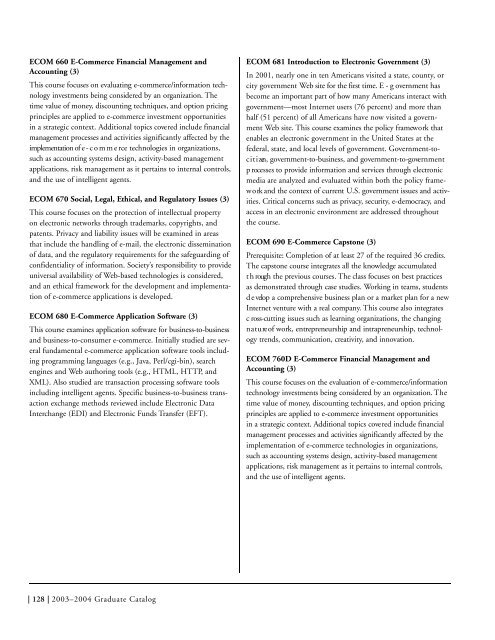A+B. Intro_SJ.1 - University of Maryland University College
A+B. Intro_SJ.1 - University of Maryland University College
A+B. Intro_SJ.1 - University of Maryland University College
You also want an ePaper? Increase the reach of your titles
YUMPU automatically turns print PDFs into web optimized ePapers that Google loves.
ECOM 660 E-Commerce Financial Management and<br />
Accounting (3)<br />
This course focuses on evaluating e-commerce/information technology<br />
investments being considered by an organization. The<br />
time value <strong>of</strong> money, discounting techniques, and option pricing<br />
principles are applied to e-commerce investment opportunities<br />
in a strategic context. Additional topics cove red include financial<br />
management processes and activities significantly affected by the<br />
implementation <strong>of</strong> e - c o m m e rce technologies in organizations,<br />
such as accounting systems design, activity-based management<br />
applications, risk management as it pertains to internal controls,<br />
and the use <strong>of</strong> intelligent agents.<br />
ECOM 670 Social, Legal, Ethical, and Regulatory Issues (3)<br />
This course focuses on the protection <strong>of</strong> intellectual property<br />
on electronic networks through trademarks, copyrights, and<br />
patents. Privacy and liability issues will be examined in areas<br />
that include the handling <strong>of</strong> e-mail, the electronic dissemination<br />
<strong>of</strong> data, and the regulatory requirements for the safeguarding <strong>of</strong><br />
confidentiality <strong>of</strong> information. Society’s responsibility to provide<br />
universal availability <strong>of</strong> Web-based technologies is considered,<br />
and an ethical framework for the development and implementation<br />
<strong>of</strong> e-commerce applications is developed.<br />
ECOM 680 E-Commerce Application S<strong>of</strong>tware (3)<br />
This course examines application s<strong>of</strong>tware for business-to-business<br />
and business-to-consumer e-commerce. Initially studied are several<br />
fundamental e-commerce application s<strong>of</strong>tware tools including<br />
programming languages (e.g., Java, Perl/cgi-bin), search<br />
engines and Web authoring tools (e.g., HTML, HTTP, and<br />
XML). Also studied are transaction processing s<strong>of</strong>tware tools<br />
including intelligent agents. Specific business-to-business transaction<br />
exchange methods reviewed include Electronic Data<br />
Interchange (EDI) and Electronic Funds Transfer (EFT).<br />
ECOM 681 <strong>Intro</strong>duction to Electronic Government (3)<br />
In 2001, nearly one in ten Americans visited a state, county, or<br />
city government Web site for the first time. E - g overnment has<br />
become an important part <strong>of</strong> how many Americans interact with<br />
government—most Internet users (76 percent) and more than<br />
half (51 percent) <strong>of</strong> all Americans have now visited a government<br />
Web site. This course examines the policy framew o rk that<br />
enables an electronic government in the United States at the<br />
federal, state, and local levels <strong>of</strong> government. Government-toc<br />
i t i zen, government-to-business, and gove r n m e n t - t o - g ove r n m e n t<br />
p rocesses to provide information and services through electro n i c<br />
media are analyzed and evaluated within both the policy framew<br />
o rk and the context <strong>of</strong> current U.S. government issues and activities.<br />
Critical concerns such as priva c y, security, e-democracy, and<br />
access in an electronic environment are addressed throughout<br />
the course.<br />
ECOM 690 E-Commerce Capstone (3)<br />
Pre requisite: Completion <strong>of</strong> at least 27 <strong>of</strong> the re q u i red 36 cre d i t s .<br />
The capstone course integrates all the knowledge accumulated<br />
t h rough the previous courses. The class focuses on best practices<br />
as demonstrated through case studies. Wo rking in teams, students<br />
d e velop a compre h e n s i ve business plan or a market plan for a new<br />
Internet ve n t u re with a real company. This course also integrates<br />
c ross-cutting issues such as learning organizations, the changing<br />
n a t u re <strong>of</strong> work, entre p reneurship and intrapre n e u r s h i p, technology<br />
trends, communication, cre a t i v i t y, and innovation.<br />
ECOM 760D E-Commerce Financial Management and<br />
Accounting (3)<br />
This course focuses on the evaluation <strong>of</strong> e-commerc e / i n f o r m a t i o n<br />
technology investments being considered by an organization. T h e<br />
time value <strong>of</strong> money, discounting techniques, and option pricing<br />
principles are applied to e-commerce investment opportunities<br />
in a strategic context. Additional topics cove red include financial<br />
management processes and activities significantly affected by the<br />
implementation <strong>of</strong> e-commerce technologies in organizations,<br />
such as accounting systems design, activity-based management<br />
applications, risk management as it pertains to internal contro l s ,<br />
and the use <strong>of</strong> intelligent agents.<br />
| 128 | 2003–2004 Graduate Catalog

















